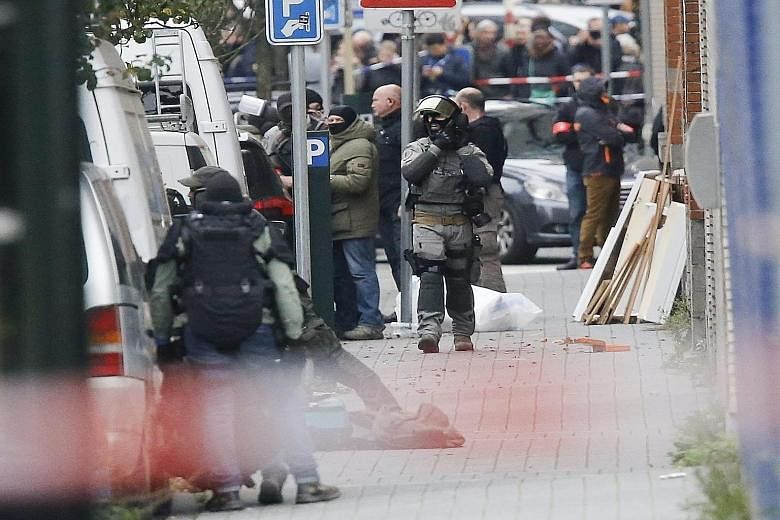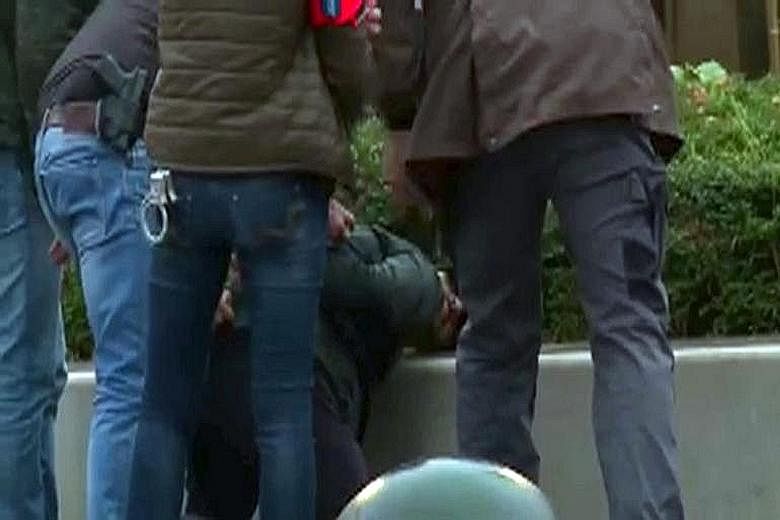PARIS • Amedy Coulibaly, who carried out the January attack on a kosher supermarket in Paris, is believed to have bought weapons in Molenbeek; Mehdi Nemmouche, a Frenchman who targeted the Jewish Museum of Belgium in Brussels in 2014, killing four people, also reportedly obtained weapons there.
Most recently, Ayoub El Khazzani, a Moroccan who was thwarted in his attempt to attack passengers on a high-speed train to Paris from Amsterdam, is also thought to have lived there at some point.
"I notice that each time, there is a link with Molenbeek," Prime Minister Charles Michel of Belgium said on Sunday.
"This is a gigantic problem."
Investigators have identified three brothers in Molenbeek as crucial suspects in the Paris attacks. Belgian prosecutors identified one, Ibrahim Abdeslam, as the suicide bomber who struck the Comptoir Voltaire cafe.
Another brother, Mohamed, was detained on Saturday in Molenbeek.

A third, Salah Abdeslam, 26, described as dangerous, is the subject of a widening manhunt by the French. He apparently slipped through their fingers immediately after the attacks.
"He was stopped and his papers were checked," said a spokesman for the Paris prosecutor's office.
Asked if there had been anything in his papers to indicate that he should have been arrested, she replied: "Nothing."
Two vehicles used in the attacks were rented in Belgium last week, the federal prosecutor for Belgium announced on Sunday. One was a grey Volkswagen Polo, abandoned near the Bataclan concert hall after being used by the three attackers who died there.
The other, a black Seat Leon, was discovered early on Sunday in the eastern Paris suburb of Montreuil. Inside were three Kalashnikov rifles; there was speculation that the vehicle was a getaway car for gunmen in central Paris.
Beyond Belgium, the investigation also focused on a presumed support network in France, and on Greece, amid the possibility that one of the attackers had come into Europe posing as a refugee.
It is still unclear whether one of the suicide bombers was a Syrian citizen who had come into Greece last month on one of the thousands of boats arriving from Turkey.
Investigators found a Syrian passport near the remains of one of the suicide bombers. On Sunday, Greek officials confirmed that someone holding that passport, in the name of Ahmad al-Mohammad, 25, had landed on the Greek island of Leros on Oct 3, and then travelled through Croatia and Serbia.
The possibility that terrorists have sneaked into Europe posing as refugees has inflamed the already explosive migrant debate. But a senior European counter-terrorism official raised a yellow flag about the passport, saying that the authorities were still not convinced he was one of the gunmen.
He said when foreign fighters go to Syria, the Islamic State in Iraq and Syria (ISIS) makes them surrender their passports. If they are killed, or even if they are not, their passports can be given to someone else returning home.
The US, France and several European countries had obtained intelligence in recent months showing that ISIS was plotting something in France, but the countries did not know when it would occur and what it would entail, according to senior American officials.
Several Western intelligence agencies helped develop the information, the officials said, adding that the agencies had shared the information with one another.
Since ISIS grabbed wide stretches of territory in Syria and Iraq last year, the intelligence agencies have detected a wide array of chatter about potential plots, but many never came to fruition.
"We had some indication something was happening, but we did not have enough information to take action to disrupt it," one of the officials said. "We didn't know when and where."
NEW YORK TIMES


